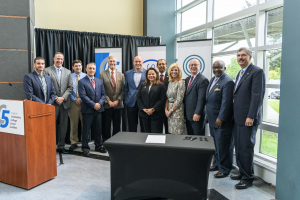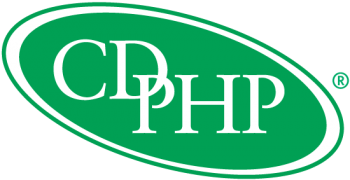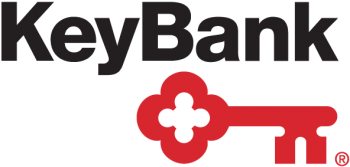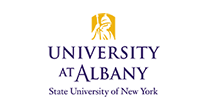News
September 18, 2018Capital Region Community Colleges Launch Coalition in Response to Workforce Shortage
 Five SUNY community colleges made their collective case for a place at the economic development table today, with the official launch of the Capital Community College Career Coalition (C5).
Five SUNY community colleges made their collective case for a place at the economic development table today, with the official launch of the Capital Community College Career Coalition (C5).
C5, a collaborative effort of Columbia-Greene Community College, Fulton-Montgomery Community College, Hudson Valley Community College, SUNY Adirondack and SUNY Schenectady County Community College, aims to create new career pathways for Capital Region residents by identifying skill gaps, strengthening partnerships with local businesses, and developing new relationships between the colleges and workforce development entities.
Each of the Capital Region community college presidents signed the Contract for 21st Century Career Training – a pledge to work together to solve workforce shortages – to formalize the initiative today, along with local workforce partners and industry representatives, including Timothy Beckett, the COO of Townsend Leather Co. Inc. in Johnstown; David Fingar, Chief Engineer at Mid-Hudson Cablevision in Catskill; Bill Hart, Vice President of U.S. Business Operations for Irving Consumer Products in Rotterdam; Jake Kolar, Senior Controls Engineer for Beech Nut, in Amsterdam, and John Zayhowski, Chief of Manufacturing for Watervliet Arsenal.
Speaking on behalf of C5, Dustin Swanger, Ed.D., president of Fulton-Montgomery Community College, said that the coalition will work toward developing actionable, sustainable solutions to help grow the supply of potential workers for high-tech industries and other jobs in the region.
“Whether it’s in manufacturing, software development, or health care, we know that there is a labor shortage right now in the region; but there is also a skills gap between what companies need and what those in the workforce can offer,” said Swanger. “Our job as community colleges is to recognize that gap, and to work together to educate people for the careers that are out there.”
Andrew Kennedy, president of the Center for Economic Growth (CEG) based in Albany, N.Y., added that CEG’s research indicates that a low unemployment rate, combined with an increase in job postings, have resulted in a shortage of qualified workers trained to fill emerging jobs. During the first half of 2018, the Capital Region averaged 11,627 beginning-of-the-month job postings, up 5 percent from the first half of 2017, according to a Center for Economic Growth (CEG) analysis of New York State Jobs Express data.
“Every job opening represents an opportunity for a stronger and more inclusive economy for the Capital Region and a better livelihood for its residents,” he said. “CEG and our community colleges are working together to build and expand talent pipelines so no opportunities are missed.”
“The Capital Community College Career Coalition is a perfect example of SUNY’s commitment to increasing and expanding partnerships” said Johanna Duncan-Poitier, the State University of New York’s Senior Vice Chancellor for Community Colleges and the Education Pipeline. “There continues to be a strong demand for trained workers and SUNY is proud to be a key partner in addressing this need. We look forward to watching this coalition educate students and support the future workforce of employers in the region and throughout New York State.”
With a deeply-rooted mission to support the region’s business community with skilled workers, today the group released a list of 100 credit-bearing and credit-free skills and career-oriented programs created within the past five years.
Collaborative work to market the region’s community colleges as a leading workforce training partner continued in 2017 with a series of online videos underscoring the various college-to-career programs available to Capital Region residents. For more information, visit 518jobtraining.com.
To move the conversation forward, a C5 Summit has been planned for Friday, Nov. 2, and will include representatives from educational institutions, legislative groups, non-profit organizations, and for-profit businesses in both the public and private sectors.



























